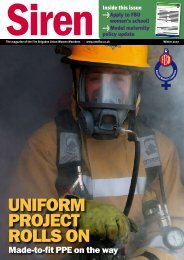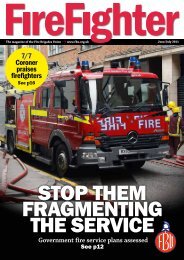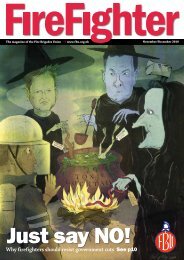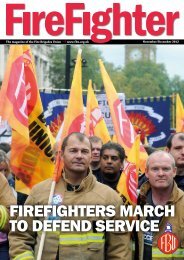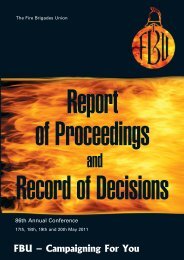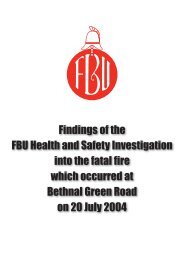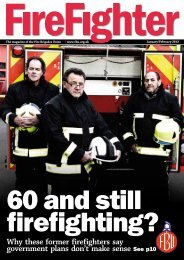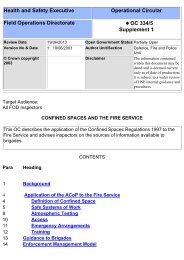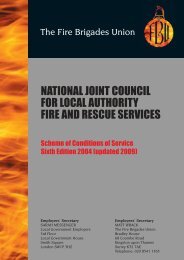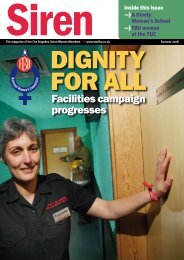Report - Fire Brigades Union
Report - Fire Brigades Union
Report - Fire Brigades Union
You also want an ePaper? Increase the reach of your titles
YUMPU automatically turns print PDFs into web optimized ePapers that Google loves.
SECTION B — FIRE AND RESCUE SERVICE POLICY<br />
Whatever arrangements are set in place, the Government<br />
should ensure that the body does not become some form<br />
of quango. We see strong links between such a body and<br />
arrangements already in place for National Resilience<br />
assurance.<br />
8. THE FUTURE OF THE FIRE SERVICE COLLEGE<br />
What is the future of the <strong>Fire</strong> Service College and what<br />
is the best way to ensure its ongoing viability.<br />
We have looked at the viability and future role of the <strong>Fire</strong><br />
Service College (FSC). It is apparent from a number of<br />
comments in the <strong>Fire</strong> Futures document portfolio that<br />
there is no appetite within the <strong>Fire</strong> Service to lose the<br />
resource. However, the College is an Executive<br />
Agency/Trading Fund and it has not performed well over<br />
the years since it was established. Its market share is low,<br />
and competition from other FRA training establishments<br />
has grown. All of which prompted a strategic review in<br />
2008/09. This review concluded that the College could<br />
achieve financial sustainability and generate profits by<br />
operating on a fully and explicitly commercial basis.<br />
The College is planning to break even this financial year.<br />
With improved marketing and sustained improvement to<br />
the College’s brand, this should result in increased training<br />
revenues, and overall, these cash measures should lead to<br />
an increase in profitability. Such improvements will<br />
potentially make the College operation more attractive to<br />
buy-in by the private sector and other potential partners,<br />
although financial investment by others to achieve return<br />
on investment will surely be dependent on an increase in<br />
market share and diversification and extension of product<br />
not with-standing debt and asset value issues.<br />
The College operates in a competitive training market in<br />
which a number of customer FRS bodies directly compete<br />
with it, leading to over-supply in the market. The local<br />
training facilities and staff at these FRS are generally<br />
funded by the tax payer/rate payer and represent additional<br />
cost to the public purse – this does not appear to represent<br />
value for money in any way. Nor is the playing field for<br />
pricing a level one: the College must consider its full<br />
overheads in its prices, whilst competitor FRSs do not<br />
appear to factor in those ongoing overheads which are paid<br />
for out of their grant, such as training facility maintenance<br />
and staff costs. In addition, this landscape has led to<br />
fragmented standards of training, as identified in the recent<br />
HSE report, especially around incident command.<br />
The question is whether the current Trading Fund model is<br />
the best model to achieve the greatest success. There is<br />
little doubt that greater commercial freedom of manoeuvre<br />
would be of significant benefit whilst transforming the<br />
College’s operation. Our recommendation would be a more<br />
pragmatic and financially viable Joint Venture model which<br />
is sector partnered with service delivery separated from<br />
governance/commissioning and exposed to the marketplace.<br />
A possible way of piloting this would be to re-establish the<br />
<strong>Fire</strong> Service College as a Joint Venture with the private<br />
sector. One half of the joint venture would be an employee<br />
owned mutual that is partly owned in the public interest. It<br />
is suggested that if there were a demonstrable success<br />
with this joint venture, this would facilitate consideration of<br />
whether the model was applicable elsewhere in the sector,<br />
including the running of brigades to the extent that lessons<br />
learned are applicable to organisations with different<br />
accountability and financial structures.<br />
Joint ventures can access new markets and distribution<br />
networks. Joint ventures increase capacity by having more<br />
resources, technology, specialised staff and capital to<br />
leverage. Thirdly risks and costs can be shared with the<br />
partner. The joint venture can also offer flexibility, because<br />
it can run with a limited life span. The FSC’s annual report<br />
cites a specific objective for the FSC is to ‘progress<br />
towards a sustainable basis, achieving a trading surplus of<br />
£0.8 million’. According to the assessment made in the<br />
annual report this has yet to be achieved, (34%) of total<br />
revenue came from the private sector and by the FSC’s<br />
own assessment this is an underutilisation of capacity. That<br />
said, with its unique facilities for training national security<br />
emergency response, one might expect public sector<br />
organisations to be the main focus of the FSC’s work.<br />
Hence there is scope for improvements to be made as a<br />
result of greater private sector involvement and expertise.<br />
However, given the role of the College in operating for the<br />
national interest in achieving joint operability in disaster<br />
situation, it might be inappropriate to have the FSC<br />
operating on a ‘for-profit’ basis in its entirety.<br />
Closure is not a viable option for the <strong>Fire</strong> Service College<br />
because in the current climate its assets would be<br />
undervalued. However, there may be a greater role for the<br />
FRS in facilitating joint-operability with other services and<br />
the College could be developed to fulfil this function. The<br />
footprint of the College could also be potentially reduced<br />
and the sale of some of its assets could improve its<br />
financial viability.<br />
RECOMMENDATIONS – The <strong>Fire</strong> Service College<br />
●<br />
The Government should set in train an immediate<br />
assessment of the potential of the College with a view<br />
to securing its long term survival and stability by means<br />
of a joint venture arrangement.<br />
9. THE WIDER INDUSTRY COMMITMENT TO THE BUILT<br />
ENVIRONMENT AND KNOWLEDGE MANAGEMENT<br />
At the meeting of the Industry group, including<br />
professional bodies, on the 8th December, they agreed to<br />
proceed with a number of commitments relevant to the<br />
built environment and the management of knowledge, at<br />
no cost. They asked for the following comments to be<br />
included in this report:<br />
<strong>Fire</strong> safety provisions in buildings need to be based on a<br />
consistent and connected process with continuity along<br />
the chain from design through specification and<br />
construction to occupation, including extension of the best<br />
FBU Annual <strong>Report</strong> 2011 63





